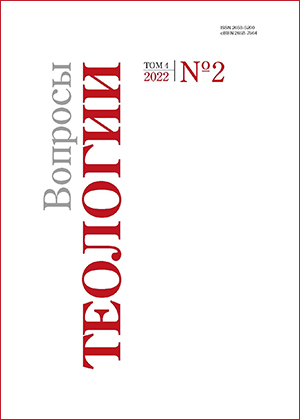The structure of an individual soul and the problem of “two minds” in the theology of Philo of Alexandria
DOI:
https://doi.org/10.21638/spbu28.2022.201Abstract
The teaching of Philo the Alexandrian is a system of the regular intersection of theological and psychological lines of reasoning. The crucial point for the Judaic thinker was the rational explanation of religious doctrine. Philo manages to do this using the Stoics’ concept of soul and its action in the light of allegoric interpretations of the central points of Genesis, such as the creation of man and the first-fall of the Progenitors. Philo’s elaboration on the Stoics’ doctrine of the soul reveals the conceptual model of relationship between God and man based on the communication between the mind and the senses within a human soul. Philo finds the universal aspect of the action of an individual mind, whose disposition towards the senses either links it to the universe and God or closes it within itself and becomes a cause of vice. Philo uses the Stoics’ distinguishing of an individual mind (hegemonikon) and the universal logos to state the transitional function of the human mind regarding God and the universe. In terms of the Stoics’ concept of the rational nature of impulse, Philo explains man’s responsibility for the appearance of evil as well as the reason for seeking the cause of the universe and its place there. Thus, Philo shows the action of an individual soul both in the context of the living processes of the whole universe and in relation to God.
Keywords:
mind, reason, soul, sense, individuality, logos, Stoicism, governing principle, hegemonikon, universe, rational soul, irrational soul
Downloads
References
References
Wolfson H. A. (1962) Philo foundations of religious philosophy in Judaism, Christianity, and Islam. In 2 vols, vol. 1. Cambridge, MA, Harvard University Press.
Downloads
Published
Issue
Section
License
Articles of "Issues of Theology" are open access distributed under the terms of the License Agreement with Saint Petersburg State University, which permits to the authors unrestricted distribution and self-archiving free of charge.




